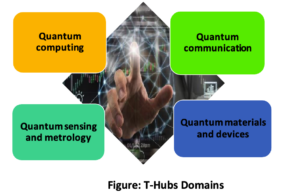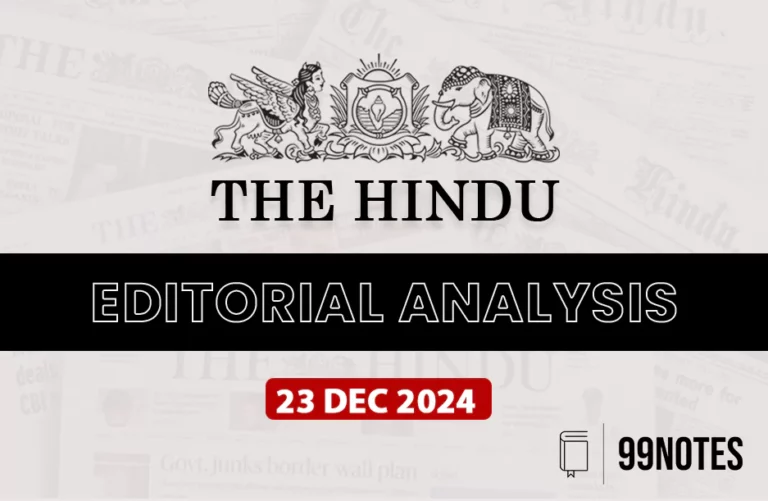10 July 2023 : The Hindu Editorial Notes PDF
The Hindu Editorial
10-July-2023
Daily Current Affairs For UPSC ,The Hindu Editorial Summary
1. The ‘Anna Bhagya’ fiasco and thinking beyond rice.
Topic: GS3 – food security.
Context:
- The Congress party in Karnataka promised the “Anna Bhagya” scheme, which aimed to provide an additional five kilograms of free rice to every member of a Below Poverty Line household.
- The coverage of the Public Distribution System (PDS) during the COVID-19 lockdowns was commendable but inadequate, and the PDS in most states lacks nutritious food items such as pulses and oil.
- Hence there is a need to analyse the PDS with its benefits and shortcomings.
Why in the news:
- The National Food Security Act (NFSA) 2013 expanded the PDS coverage, but many people are still without ration cards due to the central government’s use of outdated 2011 Census population data instead of conducting the 2021 Census.
- The under-coverage results in the exclusion of an estimated 113 million people at the all-India level, including 1.1 million in Karnataka.
- The discontinuation of the Open Market Sale Scheme (OMSS) by the central government has affected states that relied on OMSS grain to support their unique PDS schemes.
- The central government’s reasons for discontinuing OMSS include claims of better price stabilization through the market, concerns about maintaining grain stocks, and obligations to the 600 million people not covered by the PDS.
- Procuring millets, such as ragi, which are part of the local diet and nutritious, could support both farmers and consumers in Karnataka.
Shortcomings of India’s PDS:
- Inadequate coverage: Despite efforts to expand the PDS through the National Food Security Act (NFSA) 2013, there are still many people without ration cards, leading to under-coverage and exclusion from essential food support.
- Outdated population estimates: The PDS coverage is based on outdated 2011 Census data instead of the latest census. This leads to a failure to account for population growth, resulting in under-coverage and the exclusion of deserving beneficiaries.
- Lack of nutritious food items: In many states, the PDS mainly provides rice and wheat, while nutritious food items like pulses and edible oil are not adequately included. This limits the nutritional diversity of beneficiaries’ diets.
- Leakage and corruption: The PDS faces challenges related to leakages and corruption, with reports of diversion of subsidized grains meant for the poor to the open market. These issues result in the intended beneficiaries not receiving their entitled benefits.
- Poor quality and storage concerns: The quality of food grains provided through the PDS is sometimes substandard, affecting the nutritional value and taste. Additionally, inadequate storage facilities and improper handling of grains can lead to spoilage and wastage.
- Inefficient delivery mechanisms: The distribution of food grains through the PDS is often plagued by administrative inefficiencies, delays, and inadequate monitoring. This can result in beneficiaries facing difficulties in accessing their entitled rations in a timely manner.
- Limited diversification and local relevance: The PDS primarily focuses on providing rice and wheat, neglecting the inclusion of locally relevant and culturally appropriate food items. This limits the effectiveness of the system in addressing regional nutritional needs and preferences.
Way forward:
- Updating population estimates: Conduct the 2021 Census to ensure accurate population data for determining PDS coverage and allocations, enabling better targeting of beneficiaries.
- Expansion of coverage: Take proactive steps to include all deserving households in the PDS by ensuring the issuance of ration cards to eligible individuals and families, especially those from marginalized and vulnerable communities.
- Nutritional diversification: Enhance the PDS by including nutritious food items such as pulses, edible oil, and locally relevant grains, in addition to rice and wheat. This will help improve the nutritional value and dietary diversity of beneficiaries’ food intake.
- Strengthening transparency and accountability: Implement robust monitoring and surveillance mechanisms to detect and prevent leakages, corruption, and diversion of subsidized grains. Embrace technology solutions such as digitized ration cards, GPS-enabled tracking systems, and real-time data reporting to enhance transparency and accountability.
- Improved storage and distribution infrastructure: Invest in the development and maintenance of proper storage facilities, including warehouses and cold storage, to ensure the quality and safety of food grains. Enhance logistics and distribution mechanisms to ensure timely and efficient delivery of rations to beneficiaries.
- Social audits and grievance redressal: Establish mechanisms for regular social audits, involving civil society organizations and beneficiaries, to assess the functioning of the PDS, identify issues, and address grievances. Set up responsive and accessible grievance redressal systems to handle complaints and ensure timely resolution.
- Promoting sustainable agriculture and local procurement: Encourage local procurement of food grains from small-scale farmers, promoting sustainable agriculture practices and strengthening local economies. This can be achieved through partnerships with farmer cooperatives, promoting organic farming, and supporting farmers in accessing markets.
Source: The Hindu, 10 July 2023, page 6.
2. Restoring the World Trade Organization’s crown jewel
Topic: GS2 – Global organisations.
Context:
- The issues surrounding the revival of the World Trade Organization’s (WTO) dispute settlement system (DSS) and the challenges posed by the United States have created significant obstacles.
- Various demands have been raised to stabilise the proper dispute settlement system in WTO.
The way forward can include following measures:
- Defining the appellate body’s role: Address the concerns raised by the United States regarding judicial overreach and the creation of binding precedents. Work towards a precise definition of the appellate body’s mandate and its limitations to ensure that its decisions do not exceed its assigned institutional scope.
- Clarifying the use of precedents: Recognize that international law does not have a formal system of binding precedents like the common law system. However, the appellate body can promote consistency by encouraging reliance on previous interpretations while allowing departures if there are valid reasons. Develop a clear understanding among WTO member countries that appellate body rulings do not create binding precedents.
- Addressing concerns through dialogue: Engage in constructive discussions and negotiations with the United States and other WTO member countries to address their concerns and find mutually agreeable solutions. Seek to understand the underlying issues and work towards practical resolutions that satisfy the interests of all parties involved.
- De-judicialisation versus oversight: Distinguish between de-judicialisation, which aims to weaken international courts and regain decision-making power, and political oversight, which seeks to improve the functioning of the appellate body. Strive to strike a balance that maintains the WTO’s role as a legal framework while allowing for appropriate political oversight to address any shortcomings.
- Exploring alternative approaches: Consider alternative mechanisms or reforms that can effectively resolve trade disputes and maintain the rule of law in global trade. Explore options such as expert panels or independent arbitration to ensure fair and timely resolution of disputes while addressing concerns raised by WTO members.
- Voting for appellate body members: As a last resort, countries can resort to voting at the WTO’s General Council meeting to elect appellate body members. However, this may further strain relations with the United States and should be carefully considered in terms of potential consequences and the willingness of countries to pursue this path.
Conclusion:
Ultimately, finding a way forward for the WTO’s dispute settlement system requires a delicate balance between addressing concerns raised by the United States and other members while upholding the principles of multilateral trade and the rule of law. It will require open dialogue, compromise, and a commitment to strengthening and improving the functioning of the WTO’s dispute settlement mechanism.
Model question: Examine the role of the WTO in the global trade regime and analyze the impact of its dispute settlement mechanism on the functioning of the organization. Suggest comprehensive reforms that can enhance the effectiveness, inclusivity, and legitimacy of the WTO, taking into account the evolving dynamics of international trade and the changing priorities of member countries. (20 Marks)
Source: The Hindu, 10 July 2023, page 6.
For Enquiry

10 July 2023 : The Hindu Editorial

10 July 2023 : PIB

10 July 2023 : Indian Express

10 July 2023 : Daily Current Affairs

8 July 2023 : Daily Quiz

8 July 2023 : The Hindu Editorial

8 July 2023 : PIB

8 July 2023 : Daily Current Affairs

8 July 2023 : Indian Express

Science Reporter June 2023
The Hindu 10 July 2023 : The Hindu Editorial The Hindu Editorial
8-July-2023
Daily Current Affairs For UPSC ,The Hindu Editorial Summary
Facebook-f
Twitter
Youtube
1….
PIB 10 July 2023 : PIB PRESS INFORMATION BUREAU
10-July-2023
Daily Current Affairs For UPSC ,The PIB ( Press Information Bureau…
Indian Express 10 July 2023 : Indian Express Indian Express
10-July–2023
The Indian Express, CSE candidates can stay informed about current…
Daily Current Affairs 10 July 2023 : Daily Current Affairs DAILY CURRENT AFFAIRS
10-July-2023
Daily Current Affairs For UPSC ,Daily Current affairs of The hIndu…
Daily Quiz 8 July 2023 : Daily Quiz 8 july 2023 : daily Quiz…
The Hindu 8 July 2023 : The Hindu Editorial The Hindu Editorial
8-July-2023
Daily Current Affairs For UPSC ,The Hindu Editorial Summary
Facebook-f
Twitter
Youtube
1. Sobriety…
PIB 8 July 2023 : PIB PRESS INFORMATION BUREAU
8-July-2023
Daily Current Affairs For UPSC ,The PIB ( Press Information Bureau…
Daily Current Affairs 8 July 2023 : Daily Current Affairs DAILY CURRENT AFFAIRS
8-July-2023
Daily Current Affairs For UPSC ,Daily Current affairs of The hIndu…
Indian Express 8 July 2023 : Indian Express Indian Express
8-July–2023
The Indian Express, CSE candidates can stay informed about current…
Science Reporter Science Reporter June 2023 Article 1: National Quantum Mission: A Boost to India’s Quantum Endeavours
Recently, National Quantum…



